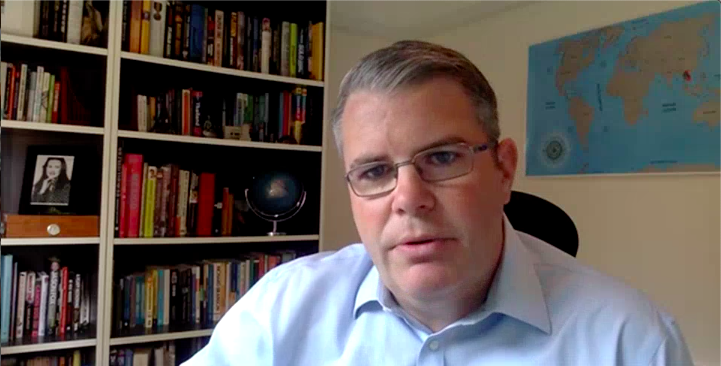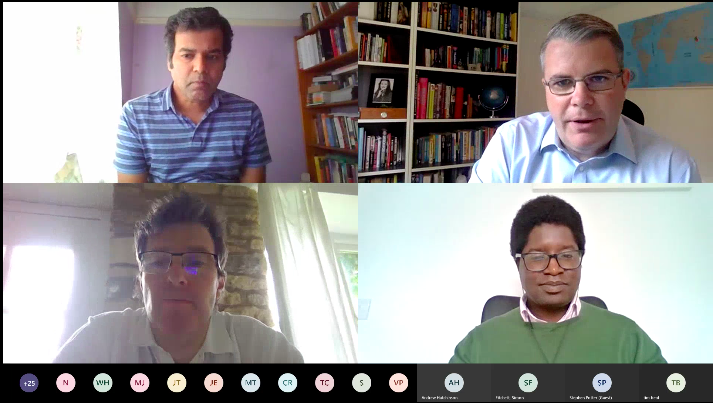Webinar roundup driving your digital agenda in an business as unusual climate with James Turnbull
As the government continues to move us closer to transitioning towards back to 'normal', organisations are under pressure to look at how they can redefine their operating models, transform their ways of working, drive their product proposition and deliver best in class customer experience. In short, there’s a lot of work that needs to be done when it comes to digital transformation before a real sense of new normality can be achieved.
With many tech leaders now having to rethink their digital roadmaps, we felt it was worthwhile to discuss what they will need to consider now we’re faced with a 'business as unusual' economic environment.
Spearheading this interesting topic as part of our Deltra webinar sessions, was James Turnbull, a Senior Digital Associate who is one of the UK’s leading digital thinkers, having had a transformative effect on the digital fortunes of organisations such as Domestic & General, The AA and British Gas. James’ endless knowledge and infectious enthusiasm for digital transformations made him an obvious choice for this digital roundtable session.

Building a digital roadmap
James began the session by discussing how businesses can start to build a roadmap of priorities in their digital transformation journeys, that is still in line with their current capabilities. He said “
“Digital is no longer optional. Now is an opportune time for people to pause, reflect and understand what their organisation needs to be doing digitally, and where they need to move forward to. I know many boards thought they knew what digital transformations meant for them and what they need to look like; many had 3 to 5-year plans that now need to be 12 months max. These organisations need to pivot, recover revenues and better understand how they can better engage customers in this post-pandemic world. “
For organisations who don’t know what their next steps are in order to move forward are, James explained that a simple approach is always the best. He suggests taking a step back to look at your current capabilities, which things you can change right now and what things are going to make the most impact in terms of reducing customer effort and cost to serve and increasing customer satisfaction and engagement. These are the things you should be focusing on before anything else.
James then opened the digital roundtable up for discussion to give the attendees the opportunity to share their thoughts and insights too. One attendee said he was concerned that because the outcomes for digital agendas have been accelerated due to the pandemic, businesses will now be in more of a hurry to get to larger outcomes quicker, rather than taking a smaller, incremental approach. In response to this, James suggested that in order to achieve successful acceleration in digital journeys, organisation’s need to have buy-in from their senior leadership and board members, which can then gradually trickle down into the wider business.
Drawing on his previous digital transformation experience, James explained that when he’s trying to ascertain what an organisation's digital ambitions should be, he always looks at two key drivers of engagement. The first is utility and whether or not the thing that is being built is useful to the people it is being targeted towards and secondly, he considers the simplicity and ease of use. To achieve customer advocacy and engagement, you need to have a healthy balance of both of these factors or nobody will use what you’re offering.
Technology governance
As the session moved onto the technological aspect of digital transformations, one of the session’s attendees asked James to explain how organisations can maintain good technical governance without having to take shortcuts to remain quick and agile. This was something that the attendee admitted that his organisation had struggled with, as they felt pressured to accelerate their digital transformations as a result of the pandemic.
James said “We all want to move fast and get new capabilities out there, but we have to do that in a very structured, sensible way. In my opinion, a lot of this is down to relationships, particularly between stakeholders, and being able to have honest conversations to ensure your goals and intended outcomes are aligned. Creating a technology framework that allows you to operate in a decoupled way that gives ownership to specific teams works very effectively in my experience.”

Trends for digital talent
James then went on to discuss which digital talent trends we’re likely to witness here in the UK, as we gradually begin to emerge from the coronavirus pandemic. With the pandemic opening the eyes of many organisations to the importance of a strong digital strategy and team, James explained that good digital talent is likely to be more expensive and in higher demand than ever before.
However, in his opinion, James believes that because of remote working, brands will find it harder to nurture junior level digital talent, which could mean they hire in favour of more experienced senior talent who can self-manage and motivate with little nurturing needed. He also added that we might also see a surge in digital consultancies in the post-pandemic world. These consultancies could pose stiff competition for more traditional agencies by setting higher day rates and therefore attract more digital talent to their door. This could lead to many traditional agencies going out of business or having to rethink their focus going forward.
James also added that because many organisations want to continue enabling their teams to work remotely as a result of the pandemic, this could open the door for more offshore digital talent opportunities and encourage a change in hiring strategies. So rather than only hiring talent from the UK, organisations could start utilising talent from all over the world- which could work in their favour should there be increased competition and less talent to choose from in the UK.
Ways of working
COVID-19 acted as a catalyst for many businesses to consider their ways of working, but while some have embraced the use of new processes and technologies, there will always be some who are resistant to change. James said “Everyone likes to talk about change but nobody wants to change. You can’t leave work on a Friday having worked the same way for a decade then go back to work on a Monday and decide you’re now agile. It never works; it’s too much, too soon. You may have to accelerate this in a post-pandemic world, but I would start small with a new team with a new approach and have honest communications with the wider team about the pros and cons of this new approach. Only when it is accepted should you roll this out to the next team and so on.”
James added that strong, consistent leadership was essential and that there’s no such thing as too much internal communication. Rather than just talking about the end outcome of your proposed change, if you want to increase the likelihood of buy-in from employees, James suggests communicating the entire journey from start to finish so everyone is on the same page and feels somewhat involved.
Making positive steps forward in this highly unusual economic climate can seem overwhelming. But if James’ insight and our attendee's contributions during this session have taught us anything, it’s that businesses who embrace the uncertainty and utilise new ideas and approaches to their digital transformations are most likely to be the ones who make it through successfully.
21st July
Events
Related insight
Related News
Looking to
transform?
Quicklinks

Address
Deltra Group
52-54 Gracechurch St
London
EC3V 0EH
Contact
+44 (0)207 375 9500
info@deltragroup.com



